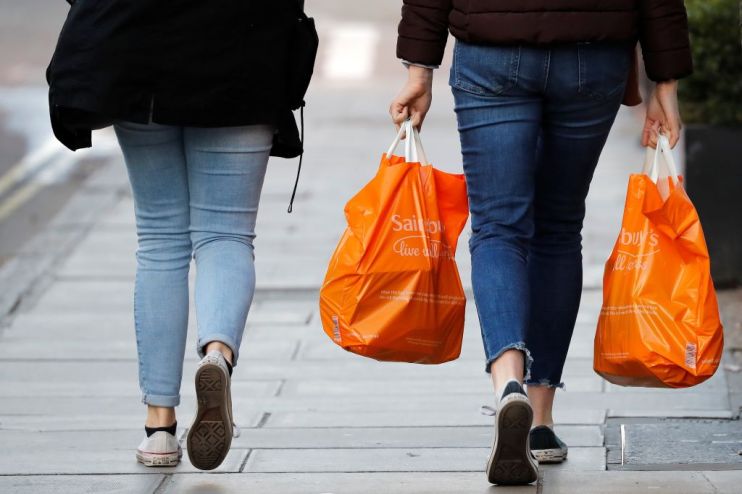UK supermarkets further increase plastic footprint despite pledges

Seven out of the UK’s top 10 supermarkets increased their plastic footprint , as the total amount of plastic packaging used rose to 900,000 tonnes a year.
Out of the UK’s 10 largest supermarkets, only Waitrose, Tesco and Sainsbury’s achieved marginal reductions over the past 12 months.
Read more: Unilever pledges to cut plastic use in half
The report, a collaboration between the Environmental Investigation Agency (EIA) and Greenpeace, urges supermarkets to eliminate single-use plastics by offering packaging free products or switching to reusable packaging.
It finds that the increase comes despite the fact that all 10 have targets to reduce their plastic packaging footprint.
However, because the amount of plastic packaging used is relative to a supermarket’s sales, it is possible for companies to hit their targets whilst still increasing its overall quantity of packaging.
The report met with a mixed response from supermarkets. Commenting on the survey, a spokesperson for Asda, which was second bottom of the survey’s league table, said:
“Whilst we are disappointed by our ranking in this year’s EIA report, we recognise that this is reflective of our increased sales year on year rather than our level of commitment to this important issue.
Read more: Sainsbury’s pledges to slash plastic packaging by 50 per cent
“Relative to our baseline year, we have already removed more than 6,500 tonnes of plastic for our customers and we’re constantly looking at new ways we can push ourselves and our suppliers harder in this area, including in trialling refillable and reusable packaging options.
“At least 30 per cent of our plastic packaging to come from recycled sources by the end of 2020, which will remove 19,500 tonnes of virgin plastic from circulation, and an overall reduction of 15 per cent by February 2021.
“All our packaging will be 100 per cent recyclable by 2025.”
Richard Walker, managing director of Iceland Foods, which fell from the top spot to seventh this year, said:
“We are incredibly proud that we galvanised change in the sector with our announcement last year. This remains the boldest and bravest of all the supermarket pledges, aiming to remove all plastic packaging from our own label range by the end of 2023.
Read more: City of London pledges plastic waste cut
“We remain single-mindedly focused on this commitment and, while we don’t have absolutely all of the solutions yet, we are firmly on track against the metrics in our five year plan.
“We have a different demographic to the new leaders in the survey – our customers do care, but unlike Waitrose shoppers they don’t have the luxury of spending more money. Therefore we have to be more innovative and invest to offer solutions without charging more. This is vital if we are to democratise environmentalism, as I believe we must.”
On the other hand, Sainsbury’s welcomed the report. A spokesperson said: “We are pleased that Greenpeace recognise Sainsbury’s progress and our ambitious commitment to be the first major retailer to reduce plastic packaging by 50% by 2025.
According to the study, another significant factor in the growth was the fact that supermarkets have failed to force their suppliers to take action on packaging.
The campaign urges supermarkets to follow Tesco’s example and give suppliers an ultimatum to cut excessive packaging or risk products being delisted.
EIA ocean campaigner Juliet Phillips said: “It’s shocking to see that despite unprecedented awareness of the pollution crisis, the amount of single-use plastic used by the UK’s biggest supermarkets has actually increased in the past year.
“Our survey shows that grocery retailers need to tighten up targets to drive real reductions in single-use packaging and items. We need to address our throwaway culture at root through systems change, not materials change – substituting one single-use material for another is not the solution.”
Read more: Boots puts the boot in plastic bags
The research also found that the number of “bags for life” sold by eight of the supermarkets rose from 960m in 2018 to 1.24bn in 2019, suggesting they are largely considered a single-use option.
Tesco’s annual sales of the bags were found to be equivalent to 11 bags per person in the UK.
A Tesco spokesperson said: “In the last year Tesco has removed 4000 tonnes of the hardest to recycle plastic and packaging and in the next year will remove a further 1bn pieces of plastic.
“Tackling plastics is a priority for us, from removing 250m carrier bags and removing the black plastic trays in ready meals to trialling more loose fresh fruit and vegetables. We continue to work closely with suppliers to remove unnecessary packaging and going forward packaging will be a factor in deciding what products we sell.
“Where we cannot remove packaging, we will reduce it to a minimum. We are helping customer reuse more packaging and all the packaging we do use will be fully recyclable.”
Environmental group A Plastic Planet welcomed the report. Co-founder Sian Sutherland said:
Read more: No emissions peak in sight as greenhouse gas levels hit record high in 2018
“Another year of plastic pacts, pledges and promises and yet the numbers don’t lie. Retailers’ pace of change is shockingly slow.
“But the tide is turning and we are driving our call for a law to ban these exports through whichever party gets into Downing Street on the 12th. All parties are claiming they will take drastic action on plastic.
“For the sake of our oceans, our soil and the health of future generations, we need to ensure they actually deliver.”